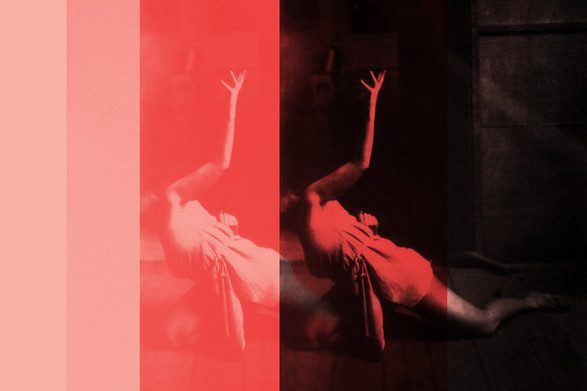Kunsthaus Graz Universalmuseum Joanneum, Graz, Austria
24 Sep 2016 - 08 Jan 2017

Anton Josef Trčka / Antios, photograph of choreographer Hilde Holger, possibly taken in the clandestine studio of artist Felix Albrecht Harta, Vienna, c. 1935/Anschluss.
This year’s steirischer herbst exhibition body luggage imagines the migration of cultural signs across borders, of body language as the signs carried on our backs, even if they are the only luggage we are able to carry.
What people bring with them in situations of exigency become the basis of archives of memory—from a previously uninhabited island’s search for « oral objects » carried by slaves and indentured workers for the proposed museum Maison des civilisations et de l’unité Réunionnaise, to the recent Archivio Memorie Migranti in Lampedusa. When on one side of the sea bodies are returned to slavery, translatable as currency, and on the other, there is time enough to frame Danish « jewellery laws » to confiscate everything of value from those seeking refuge—then among the inalienable things carried, is body language, carried like frozen shapes within the body’s own memory.
By placing history alongside artistic mutations the exhibition asks questions of how avant-garde forms transmit, or are provoked. Why does a choreographer at the centre of the Viennese dance world—forced to flee the Nazi regime within a day to Bombay carrying nothing—exchange the word « dance » for only « body movement »? Why does an Indian dancer re-invent classical forms in the ’80s, immediately following her trial of sedition against the state? What induces an artist, after torture and years in exile, to engage in an ancient form of comic dance as a basis for pioneering performance art in Burma/Myanmar under the dictatorship of the ’90s? Why does an artist consider the body parts from mass graves in Bosnia suitable for a novel non-identitarian politics of memory?
The mutation of forms, as put forward by Alois Riegl with the acanthus leaf and Aby Warburg with hand-gestures in his Mnemosyne were attempts to connect the world’s art histories to each other, through the lens of a detail. The works of body luggage open the idea of cultural continuance amidst traumatic displacement of bodies, objects and histories, through what is carried, transmitted and recast in cultural and body memory. Paintings, sculptural and moving image works, textiles, archives of photographs and drawings, an artistic lab in continuance through the duration of the exhibition, and texts that comprise a reader, challenge art history, seeking how its methods may be expanded to wider avant-garde use.
Artists and new commissions: Kemi Bassene, Padmini Chettur, Jimmy Chishi, Chaw Ei Thein, Milica Tomić, Caecilia Tripp, Simon Wachsmuth, Gernot Wieland, Sawangwongse Yawnghwe, and Portia Zvavahera
A lab run by Milica Tomić with master’s degree students, IZK Institute for Contemporary Art, Faculty of Architecture, Graz University of Technology
Works from the archives of Primavera Boman, Chandralekha (1928–2007), Shiavax Chavda (1914–90), Hilde Holger (1905–2001), Htein Lin, et al
Texts in German, English and French by Bessora, Laure Guilbert, Desmond Kharmawphlang, Francesca Recchia, Nora Sternfeld, Françoise Vergès et al; ed. Zasha Colah; trans. Nine Eglantine Yamamoto-Masson; design Chiara Figone; pub. Archive Books Berlin
Curated by Zasha Colah
Associate curator Birgit Pelzmann, steirischer herbst festival
In collaboration with Kunsthaus Graz
With its leitmotif Wir schaffen das. [We can do this.] On the Shifting of Cultural Cartographies, steirischer herbst 2016 focuses on the issue dominating discussion this year, also in the art world, and that is preoccupying us more than ever: Old Europe and its relationship to the rest of the world.
The four-week festival brings cutting-edge contemporary performance, theatre, dance and music to Graz, Austria. It works with a network of international visual arts curators, this year with Indian curator, art historian and co-founder of the Clark House Initiative, Zasha Colah. Additionally, co-operation projects with various art institutions in Graz round off the festival’s visual arts programme. steirischer herbst 2016 opens on September 23, followed by the exhibition openings on Saturday 24. The leitmotif will be the topic on October 8 & 9 at the conference « Welcome to the former West. Mental maps and decolonial perspectives on the here and now. »
.
Opening: September 24, 10am
Talking Art: October 9, 3pm
.